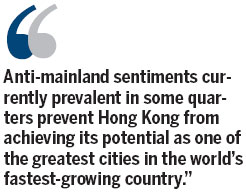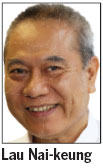Patriotism and progress
Updated: 2013-11-12 07:08
By Lau Nai-keung(HK Edition)
|
|||||||
On Oct 29, my friend Professor Thomas Chan queried in these columns, "What is Hong Kong's role?" He reviewed the history of Hong Kong's development and ended his piece with the conclusion that "when we conceptualize Hong Kong, we should not look backward. People in Hong Kong, in the Pearl River Delta region and in Beijing should look forward: to see the great future that Hong Kong could achieve for the local society as well as the nation as a whole. Hong Kong can once again make history and defy Euro-centric theories of development."
It is very true that in order to look forward, we must first look backward as well as into the present. The reason why a patriotic discourse has not taken root in Hong Kong has much to do with who we are, and where we are going.
What a lot of people have yet to realize is that discourses are not just about words. If we allude to a Cantonese slang, it is not about "blowing water". An effective discourse can make people see a full glass when it is filled only up to 70 percent of its capacity; but it would take a magician or a con artist to persuade them that a glass is full when, in fact, it is empty. And, even then, the illusion would not last long.
An effective discourse must take into account the current situation in Hong Kong. Some questions need to be answered first: who are better off after the handover and who are not? Who have the reason to believe that the rise of the nation is good for them and who do not? Perhaps only then we can begin to study the conflicts between these interests groups, how much financially powerful each of them is, and how much political clout will each wield after 2017. Currently, a patriotic discourse specific to Hong Kong, taking all of these into account, is nonexistent.

If the dialectical relationship between discourse and material interests is considered, perhaps the lack of a patriotic discourse can be blamed on Hong Kong's colonial past. When Hong Kong's interests were structured to be more aligned with the United Kingdom's by the erstwhile colonial government, it was difficult for patriotism to take root. It was easily crushed in 1967, despite local leftists' long-term organizational efforts. More importantly, the elites were easily co-opted by the colonial government. All of us were provided with a harmless alternative - patriotism geared towards the ancient Chinese culture.
It worked. Hong Kong grew and prospered then despite its population suffering a crisis of identity. Imagine what history would have become had the leftists succeeded in 1967.
If we refer to Prof Chan's framework, Hong Kong's "role" was different during that time. When China was poor and weak, our role was to suppress our patriotic instincts and work as brokers between the country and the West.
Patriotism has become an issue today because the situation has changed. Contrary to some opinions, it is not about "face" where the "unpatriotic" Special Administrative Region allegedly embarrasses our national leaders. The situation has mainly changed because our material interests have become more aligned with that of the Chinese mainland. Anti-mainland sentiments currently prevalent in some quarters prevent Hong Kong from achieving its potential as one of the greatest cities in the world's fastest-growing country.

This impasse cannot be solved by words alone, as anti-mainland sentiments are grounded in their special classes of interests. In appearance, these interests are not diametrically opposed to that of the rest of Hong Kong's society. Some of these may have actually contributed to the country's development in the past, and are treated by both the local and central governments with high respect.
At the moment, the Communist Party of China's 18th Central Committee is having its Third Plenary Session. The principal focus of the session is on rebalancing the economy, which means that vested interests associated with the old growth model would have to go.
A patriotic discourse suitable to take Hong Kong forward must follow the new thoughts churned up by the Third Plenary Session and should totally ground itself in the interests of the majority.
The author is a member of the Commission on Strategic Development.
(HK Edition 11/12/2013 page1)